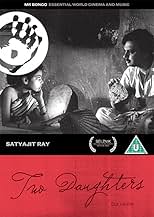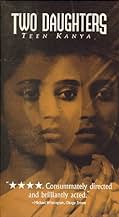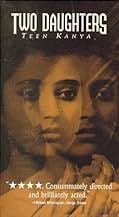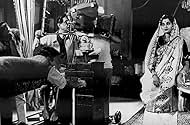Füge eine Handlung in deiner Sprache hinzuBased on popular Indian stories of the great writer Rabindranath Tagore, these short films reveal definitive moments in the lives of three young girls.Based on popular Indian stories of the great writer Rabindranath Tagore, these short films reveal definitive moments in the lives of three young girls.Based on popular Indian stories of the great writer Rabindranath Tagore, these short films reveal definitive moments in the lives of three young girls.
- Regie
- Drehbuch
- Hauptbesetzung
- Auszeichnungen
- 4 wins total
- Nandal (segment "Postmaster")
- (as Anil Chattopadhyay)
- Ratan (segment "Postmaster")
- (as Chandana Bandyopadhyay)
- Mrinmoyee (segment "Samapti")
- (as Aparna Das Gupta)
- Jogmaya (segment "Samapti")
- (as Sita Mukhopadhyay)
- Bishey (segment "Postmaster")
- (as Nripati Chattopadhyay)
- Phanibhushan Saha (segment "Monihara")
- (as Kali Bannerji)
- Schoolmaster and narrator (segment "Monihara")
- (as Gobinda Chakrabarti)
- Amulya (segment "Samapti")
- (as Soumitra Chattopadhyay)
Empfohlene Bewertungen
A Classic Poetic and Artistic Woman oriented Anthology by Satyajit Ray. I never knew that Indian Cinema has seen Anthology during 60s decade (please spare me if I'm wrong) before modern filmmaking got recognition in India. So, this idea of making Anthology in early 60s had already left stunned and additionally it has 3 wonderful stories to tell and every single one has got a powerful storyline. Based on popular Indian stories of the great writer Rabindranath Tagore, these short films reveal definitive moments in the lives of three young girls. First is The Postmaster, a story of a pre-adolescent orphan girl who shares a warm bond with the new postmaster who teaches her to write and read. This story ends on such a heart-wrenching note that will definitely leave you dazed. The second one is kind of psychological drama of a married woman who is obsessed with Jewels and her husband who is desperate to get loved by her. This one is titled Monihara and it's very gripping and thrilling ride. The final one is Samapti. Mrinmoyee, a funky teenage girl is married against her choice to a good fella Amu. After marriage she disown this relationship but when husband goes away, she realises the real meaning of Husband-Wife's relationship. If i have to rank these 3 quality wise, then The Postmaster will top the list. Sampati and Monihara to be be followed. Acting, writing, execution and cinematography everything is absolutely Classy. Hats off to Satyajit Ray for giving that much needed experimental Cinematic Classic to Indian Cinema even before Indian Cinema was ready to accept it. This is Indian Cinema's answer to Hollywood filmmaking that how to create a Magical Classic Film out of simple short stories. Overall, a Cult that started another new wave in Indian Cinema.
RATING - 8/10*
By - #samthebestest.
The Postmaster has a young man coming to a small village from Calcutta to take the job of a postmaster, and there befriending his servant, an orphan girl. In addition to all her chores she helps him deal with a local madman, as well as nurses him back to health when he contracts malaria. Meanwhile, he begins teaching her how to read and write Bengali. It's a story about the pain of separating from someone you've been touched by, echoed in the lyrics of the traditional music some of the old men play one night. Ray gives us a very nice scene when the young girl comes to the postmaster at night during his sickness, and he doesn't recognize her; the way it's shot, she almost seems otherworldly. It's the feeling of this one that delivers the biggest impact though, so touching, and so true to how things often go in life.
Monihara (Lost Jewels) is about a wife who covets jewelry above all else, and continually gets her husband to buy her a piece here or there. When his business suffers from a fire, she worries that he will need to take some of it back, and flees with the help of a cousin. The framing to the story has an author talking to a robed man who faces away from him and speaks as if he's disembodied, setting a ghostly tone, and throughout the film we get the feeling that there is something supernatural going on. For example, when the man approaches his wife from behind as she stares out the window of the mansion they've inherited, Ray moves the camera slowly to the sound of eerie music, a fantastic scene. I absolutely loved the soundtrack which Ray also scored. It's spooky and foreboding, and reflects the sickness of greed and this couple's broken relationship perfectly.
The wife (Kanika Majumdar) gets a chance to sing of longing and melancholy; she's a beautiful woman with a wonderful voice, and it's too bad her character is such a shallow person. We get the idea from the author that if her husband was more forceful, she would love and respect him more. "He didn't realize that in matters of the heart, it's brute force, not meek reticence which really works. A woman prefers the harsher things, like sour green mango and hot chilies," he tells us. While that's pretty direct, I liked how the narrative didn't explicitly inform us exactly what happens to her after she leaves, allowing the viewer to fill in the blanks. It's just a lovely, haunting little story.
The last story, Samapti (The Conclusion) has a young man returning home after his exams, only to have his mother begin pushing him to get married. She arranges things with the daughter of friends of the family, but the trouble is, he doesn't feel anything for her. Instead, he finds himself drawn to a young girl who runs around the village and gets up to various mischief, an independent free spirit who is so counter to the social convention that she's referred to as "Crazy Girl." Against his mother's wishes (and the girl's too) he arranges to marry her, not realizing that the thing that draws him to her is the very thing that will make having her settle down into the role of a wife so difficult. It's like putting a bird in a cage. I love the defiance of the girl (Aparna Sen) and the tension with her husband (Soumitra Chatterjee), though this one did seem to lag a bit, and the ending seemed a bit too cheery, perhaps to compensate for the other stories.
Overall, a good collection, and worth seeing.
The Postman is the better of the two stories. Not giving away the plot, this movie had one of the most heart-wrenching scenes in cinema. The simple, but powerful way Ray pulls his quiet films together at their end makes these quiet films very memorable. Sampati drags out somewhat longer, but has a powerful climax of its own. After years, these two movies have stuck in my memory. I would recommend them to anyone.
Wusstest du schon
- WissenswertesThe "Monihara" segment of the film was dropped for the first international release because subtitles could not be finished in time due to budgeting constraints.
- Zitate
Ratan (segment "Postmaster"): I can sing too.
Nandal (segment "Postmaster"): Is that so?
Ratan (segment "Postmaster"): I can sing now if you like.
[singing]
Ratan (segment "Postmaster"): In the lonely forest, A little girl is crying, Calling for you, Tears drop from her eyes, In the lonely forest, A little girl is crying, Calling for you, Tears drop from her eyes, With a trembling voice, She keeps calling out, With a trembling voice, She keeps calling out, The girl is lost in the forest, And nobody hears her, Nobody answers her
- Alternative VersionenOriginal Indian version includes three episodes and runs 171 minutes; the version released in the USA (retitled "The Two Daughters") features only two episodes and is 114 minutes long.
- VerbindungenFeatures Conversation with James Ivory (2010)
Top-Auswahl
- How long is Three Daughters?Powered by Alexa
Details
Box Office
- Bruttoertrag in den USA und Kanada
- 81.200 $
- Laufzeit
- 2 Std. 53 Min.(173 min)
- Farbe
- Sound-Mix
- Seitenverhältnis
- 1.33 : 1













